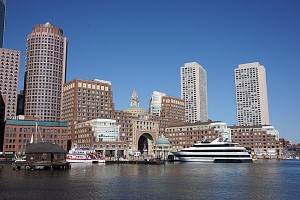Easter After Boston
 Last weekend, I was leading a women’s Bible study at a retreat for a few Bronx colleges. Since it is Easter season, I chose to focus on the Road to Emmaus story when Jesus appears as a stranger to two disciples on the road. As you may remember, the disciples decide to invite this stranger into their home for dinner, and, while he is breaking bread with them, their eyes are opened, and they realize that this stranger is actually the risen Christ. My intent in the Bible study was to get folks talking about times when they unexpectedly saw Christ in other people.
Last weekend, I was leading a women’s Bible study at a retreat for a few Bronx colleges. Since it is Easter season, I chose to focus on the Road to Emmaus story when Jesus appears as a stranger to two disciples on the road. As you may remember, the disciples decide to invite this stranger into their home for dinner, and, while he is breaking bread with them, their eyes are opened, and they realize that this stranger is actually the risen Christ. My intent in the Bible study was to get folks talking about times when they unexpectedly saw Christ in other people.
But I am learning that you can never control what conclusions people come to when you empower them to read the Bible. The Word of God cannot be tamed with a carefully packaged morality lesson.
So, of course, we got “off track” when one young woman became fixated on an unfortunate detail in the story. She just could not believe that those foolish disciples invited some stranger they had just met into their home. The young woman then told us a formative story from her childhood about a time when her mother was befriended by a stranger who later became a danger to her family.
The discussion was not going as I had planned. I wanted to get these students to think about all that can be gained when we open our lives and our hearts to other people. But this young woman had an inconvenient truth in her life: being open to another person had almost gotten her killed. When Mom invited a stranger in, instead of Christ, she saw only hazard and trouble.
Although her story spoiled the perfect lesson plan I had carefully concocted, the woman’s experience made me rethink the Easter miracle that occurs in this scripture. Perhaps the miracle that is important today isn’t that the risen Christ appeared or that the disciples’ eyes were opened to Christ in the stranger. Perhaps the miracle that is important today is that these disciples opened themselves to a stranger in spite of all the risks involved. In spite of conventional wisdom to the contrary, in spite of bad experiences they and others have had, they opened their doors and their hearts.
As I was searching for something to say to you after the terrible bombing this week in Boston, I remembered that Bible study last weekend. I’m currently attending a leadership training for young clergy in D.C., and security has tightened here since Monday afternoon, as I’m sure it has back home in New York. Every time there is an attack like this, we city dwellers think twice about the next time we are going to be in a crowded place or at a significant landmark. We second guess the presence of law enforcement, asking, “Why are they here right now? Is there a threat that I don’t know about?” We wonder if we should avoid places and people to save ourselves from being the next unwitting victim of someone’s misguided hatred. These experiences teach us to keep away, to mistrust, to fear. And that is so real to us. There is truth and wisdom in feeling unsafe and insecure in our own cities.
And at times like this, it is easier to believe in the miracle of resurrection than it is to open the doors of our wounded lives to the world. So, today, I see the Easter miracle less in the resurrection and more in the courageous ways in which we continue to open ourselves to a world that threatens to destroy us. Today, we will see the Easter miracle if the bombs do not change us into fearful xenophobes. We will see the Easter miracle if violence does not make us suspicious of each other. We will see the Easter miracle if our wholly founded fears do not prevent us from opening our lives to the world, its people, its places, its goodness.
It will be a miracle because all signs point to fear and trembling. The truth is again before us—that it is a risk to live our lives with each other—there’s no doubt about that this week. But, if we can find our faith somewhere in all these unanswered questions, we will again muster the courage to do what the Boston Marathon victims risked everything to do—to celebrate and cheer on life that is courageously lived to the fullest.
28As they came near the village to which they were going, he walked ahead as if he were going on. 29But they urged him strongly, saying, “Stay with us, because it is almost evening and the day is now nearly over.” So he went in to stay with them.
Luke 24:28-29
(Our regional bishop, Bishop Martin McLee, who is from Boston, has written a pastoral letter regarding the bombings. You can read it here.)

Pastor Vicki, what a wonderful reminder that we walk through the Valley of the Shadow of Death, but that we are to fear no evil. Will see you next time I am in NY. Blessings